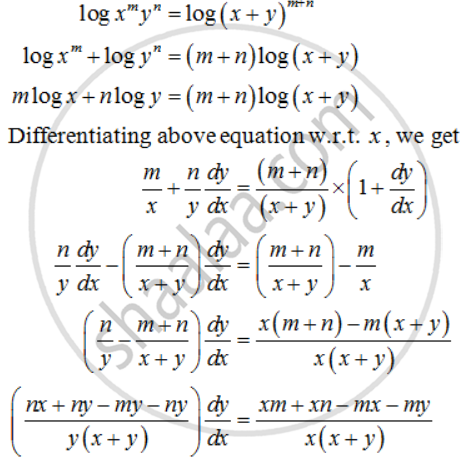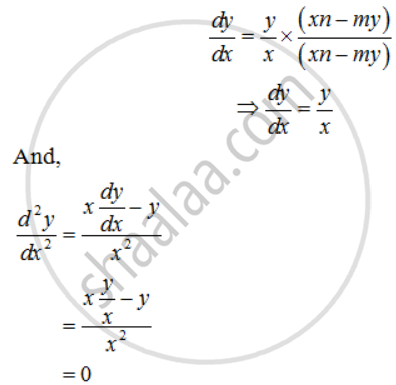Advertisements
Advertisements
प्रश्न
if `x^m y^n = (x + y)^(m + n)`, prove that `(d^2y)/(dx^2)= 0`
उत्तर
We are given
`x^m y^n = (x + y)^(m + n)`
Taking log on both sides, we get


APPEARS IN
संबंधित प्रश्न
If `y=log[x+sqrt(x^2+a^2)] ` show that `(x^2+a^2)(d^2y)/(dx^2)+xdy/dx=0`
if xx+xy+yx=ab, then find `dy/dx`.
Differentiate the function with respect to x.
cos x . cos 2x . cos 3x
Differentiate the function with respect to x.
`sqrt(((x-1)(x-2))/((x-3)(x-4)(x-5)))`
Differentiate the function with respect to x.
`(x + 1/x)^x + x^((1+1/x))`
Differentiate the function with respect to x.
`(sin x)^x + sin^(-1) sqrtx`
Differentiate the function with respect to x.
`(x cos x)^x + (x sin x)^(1/x)`
Find `dy/dx`for the function given in the question:
xy + yx = 1
Differentiate (x2 – 5x + 8) (x3 + 7x + 9) in three ways mentioned below:
- by using product rule
- by expanding the product to obtain a single polynomial.
- by logarithmic differentiation.
Do they all give the same answer?
If `y = sin^-1 x + cos^-1 x , "find" dy/dx`
Find `dy/dx` if y = xx + 5x
xy = ex-y, then show that `"dy"/"dx" = ("log x")/("1 + log x")^2`
Differentiate : log (1 + x2) w.r.t. cot-1 x.
Find `"dy"/"dx"` if y = xx + 5x
If `(sin "x")^"y" = "x" + "y", "find" (d"y")/(d"x")`
If x = `asqrt(secθ - tanθ), y = asqrt(secθ + tanθ), "then show that" "dy"/"dx" = -y/x`.
If x = sin–1(et), y = `sqrt(1 - e^(2t)), "show that" sin x + dy/dx` = 0
Differentiate 3x w.r.t. logx3.
Choose the correct option from the given alternatives :
If xy = yx, then `"dy"/"dx"` = ..........
If y = A cos (log x) + B sin (log x), show that x2y2 + xy1 + y = 0.
If y = `log[sqrt((1 - cos((3x)/2))/(1 +cos((3x)/2)))]`, find `("d"y)/("d"x)`
lf y = `2^(x^(2^(x^(...∞))))`, then x(1 - y logx logy)`dy/dx` = ______
If y = tan-1 `((1 - cos 3x)/(sin 3x))`, then `"dy"/"dx"` = ______.
`"d"/"dx" [(cos x)^(log x)]` = ______.
If y `= "e"^(3"x" + 7), "then the value" |("dy")/("dx")|_("x" = 0)` is ____________.
If `log_10 ((x^3 - y^3)/(x^3 + y^3))` = 2 then `dy/dx` = ______.
The derivative of log x with respect to `1/x` is ______.
Evaluate:
`int log x dx`
